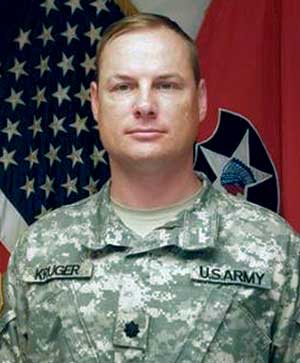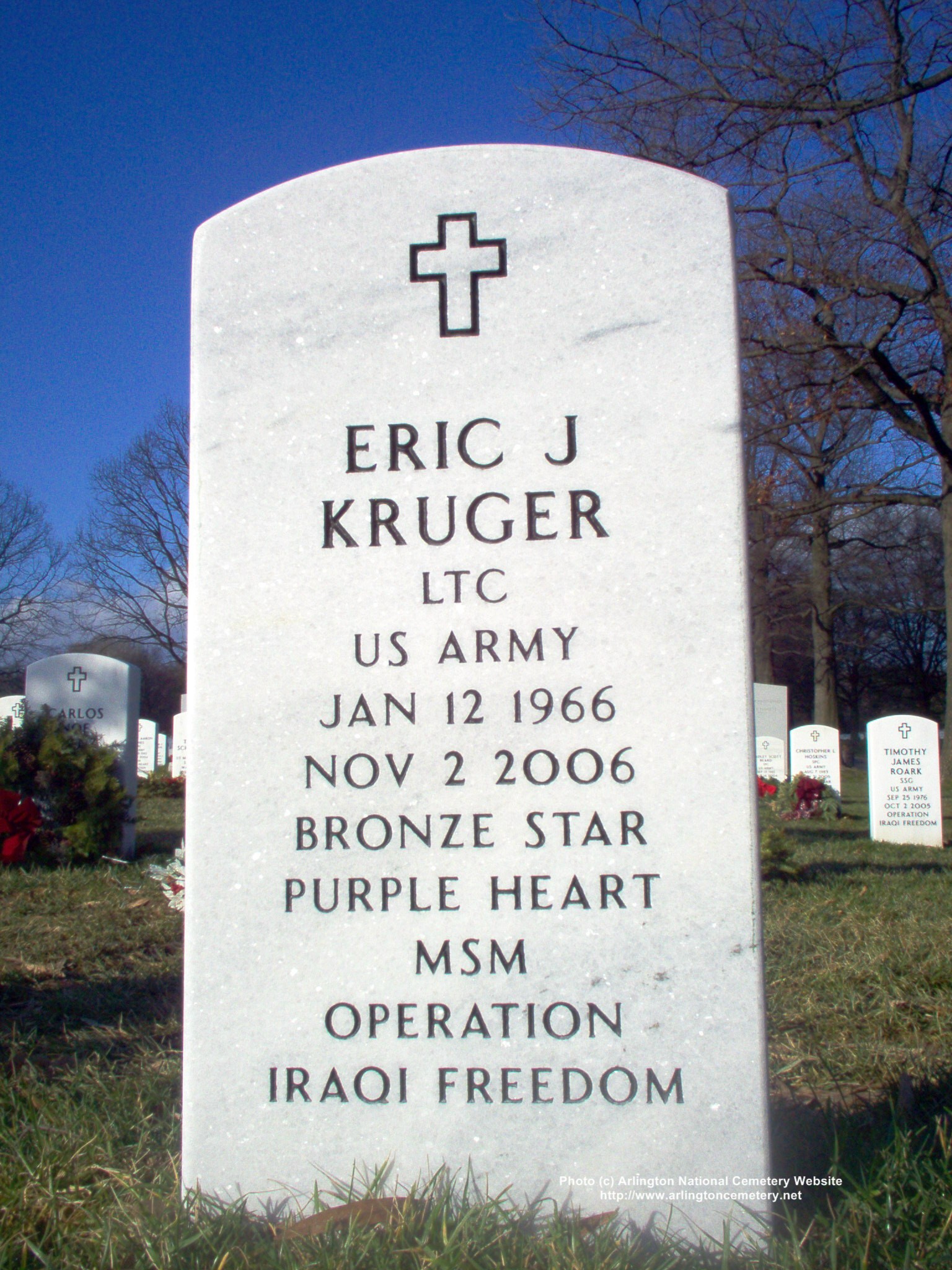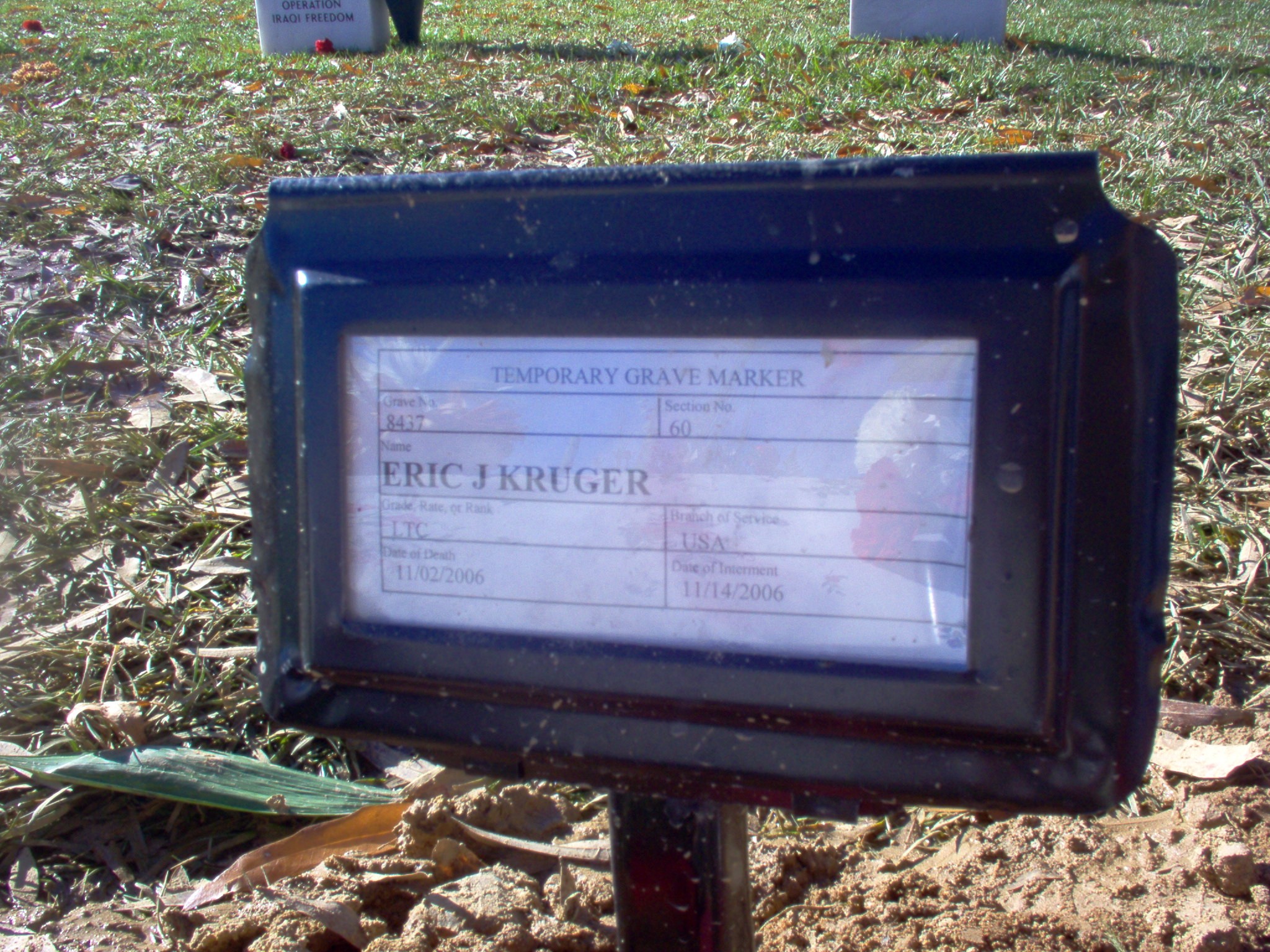NEWS RELEASES from the United States Department of Defense
No. 1123-06 IMMEDIATE RELEASE
DoD Identifies Army Casualties
The Department of Defense announced today the death of three soldiers who were supporting Operation Iraqi Freedom. They died November 2 in Baghdad, Iraq, of injuries suffered when an IED detonated near their vehicles.
Killed were:
Lieutenant Colonel Paul J. Finken, 40, of Mason City, Iowa.
Lieutenant Colonel Eric J. Kruger, 40, of Garland, Texas.
Staff Sergeant Joseph A. Gage, 28, of Modesto, California
Finken and Gage were assigned to the 1st Battalion, 506th Infantry Regiment, 4th Brigade Combat Team, 101st Airborne Division, Fort Campbell, Kentucky. Kruger was assigned to the 2nd Brigade Combat Team, 2nd Infantry Division, Fort Carson, Colorado.
Fort Carson officer dies in Iraq
Lieutenant Colonel Kruger post’s highest-ranking soldier killed in the war^
Courtesy of the Denver Post
Lieutenant Colonel Eric John Kruger was killed in Iraq on Thursday, November 2, 2006. (Fort Carson) A deputy commander of Fort Carson’s 2nd Brigade Combat Team was killed, along with two other servicemen, by a roadside bomb in Baghdad on Thursday, the military said Monday.
Colonel Eric J. Kruger, 40, of Garland, Texas, was assigned to the 2nd Brigade Combat Team, 2nd Infantry Division, at the post near Colorado Springs.
Also killed were Lieutenant Colonel Paul J. Finken, 40, of Mason City, Iowa, and Staff Sergeant Joseph A. Gage, 28, of Modesto, California. Both were assigned to the 1st Battalion, 506th Infantry Regiment, 4th Brigade Combat Team, 101st Airborne Division, Fort Campbell, Kentucky.
All three were riding in the same vehicle, the military said.
Kruger is the highest ranking soldier from Fort Carson to have died in Iraq; the next highest was a major, a base spokesperson said. He is the 174th soldier from Fort Carson to be killed in Iraq, spokeswoman Dee McNutt said.
Kruger’s mother, contacted in Frisco, Texas, declined to comment about her son until his wife feels it is time to speak publicly.
“I’m respecting the wishes of my daughter-in-law, as soon as she gives us the go-ahead we will call back to all the media,” Carol Ann Kruger said Monday. “Right now, everyone just needs to give us time.”
McNutt, who said she knew Kruger, said he was a “wonderful man and a great leader. Everyone who knew him loved him.”
Kruger had a bachelor’s degree in political science and a master’s of liberal arts from Southern Methodist University.
He entered the Army on January 7, 1989, and completed airborne and Ranger training. He also held a combat infantry badge.
Kruger served in Bahrain from August 1997 through January 1998 and in Afghanistan from February 2005 to this February.
On one of these assignments, he was awarded the Bronze Star.
From Afghanistan, he joined the 2nd Infantry Division, 2nd Brigade at Fort Carson on February 9, 2006.
Kruger left the Mountain Post with an advance team from the 2nd Brigade for Baghdad the last week of October.
He died just a few days after arriving.
Earlier this year, Kruger was interviewed by a CBS News crew doing a story about “stressed-out soldiers,” which cited statistics that showed more than 50,000 veterans from Iraq and Afghanistan are believed to be suffering from mental health problems, mainly post traumatic stress disorder.
Kruger voiced his concern that soldiers weren’t seeking help because of fears of being ridiculed or facing reprisal, and he was a voice in urging veterans to get help.
“You don’t want a soldier not to seek help for anything,” he told CBS in July. “They’re our No. 1 asset. Leaders have to engage that every day – and in my experience here, we do.”
A former Soldier from the Old Guard perished last week in Iraq, the victim of a roadside bomb. Lieutenant Colonel Eric Kruger, 40, of Garland, Texas, was one of three Soldiers killed by an improvised explosive device while riding in a Humvee in eastern Baghdad as part of Operation Enduring Freedom. The Department of Defense released his name Monday.
Kruger was assigned to the 2nd Brigade Combat Team, 2nd Infantry Division, Fort Carson, Colorado.
According to Sergeant Jeremy Kern of the Old Guard Public Affairs Office, Kruger was a member of the Old Guard from roughly 2001 to 2004, and as a Major served as the regimental S-4, the regimental executive officer and the battalion executive officer.
Kirk Heflin, director of the Old Guard Museum on Fort Myer, remembers Kruger as overseeing the museum when he was executive officer.
“He was a great supervisor who was very interested in history,” Heflin said.
“Not everyone is interested.”
When Kruger would learn some new aspect of Army lore, he’d exclaim, “Wow, I didn’t know that,” Heflin said. “He’d know a part of the story but not [necessarily] how the Old Guard hooked into it.”
Alan Bogan, previous director of the Old Guard Museum and currently a museum specialist at the Center of Military History, said Kruger’s wife regularly manned the museum gift shop as part of the Old Guard Ladies Association, and that Eric would occasionally stand in for her on Saturdays.
“I’d always see him first thing in the morning at the Shoppette when we were buying coffee,” Bogan said. “He’d ask if there was anything the museum needed.”
“He was a very good guy to work for … always cheerful and helpful,” Bogan added. “He was interested in the museum.”
“He never brushed you off,” Heflin said. “He was always interested in what you had to say.”
“It’s always sad when you lose one of your own,” said Garrison Commander Col. Thomas A. Allmon. “From all reports, Lieutenant Colonel Kruger was a Soldier’s Soldier, attentive to duty, always trying to make the community a better place and the Old Guard a more efficient unit. My heart goes out to his family.”
Kruger is scheduled to be buried at Arlington National Cemetery Tuesday. A funeral service will be held beginning at 8:45 a.m. at Fort Myer’s Old Post Chapel.
Lieuenant Colonel Eric John Kruger figured serving in the Army was a privilege, just like three generations of his family before him.
His great grandfather served in World War I, his grandfather in World War II and his father in Vietnam.
When Iraq and Afghanistan came around, it was Eric Kruger’s turn to fight.
On November 2, 2006, Kruger, the deputy commander of Fort Carson’s 2nd Brigade Combat Team, was killed along with two others when a roadside bomb destroyed their Humvee in Baghdad. He was the highest ranking Fort Carson officer to die in Iraq.
“Eric was killed his first day in country,” said his longtime friend, Lieutenant Colonel Steve Parker, after a memorial service Wednesday at Fort Carson’s Soldiers’ Memorial Chapel.
“But what’s more important, I think, are the things that took Eric there: his love of country, his love of the Army and his dedication to his family.”
Kruger was born into an Army family in Heidelberg, Germany. At age 40, with 17 years of service and fresh from a tour in Afghanistan, he volunteered for Fort Carson’s 2nd Brigade.
He was taking his orientation tour with Lieuetnant Colonel Paul Finken of the 4th Brigade, 101st Airborne Division, the unit Kruger was relieving, and their driver, Staff Sergeanat Joseph A. Gage, when the bomb killed them all.
As devoted an Army man as Kruger was, he was far from one-dimensional, Parker and others recalled during the memorial service.
Kruger was a “perpetual optimist” who loved adventure and new experiences, Parker said.
“He was curious about everything. He lived every day.”
Parker recalled taking family vacations – he and his wife along with the Krugers and their four children. And there was their yearlong tour of duty together in Botswana that included some nerve-rattling adventures.
When Kruger wanted to watch a migration of an animal herd, he was not content with watching from a hilltop.
He hired a crop duster to take him, Parker and another soldier closer to the action.
A photo taken after the flight was revealing, said Parker.
“There’s me, with a look of ‘I can’t believe we did that.’ There’s Pat, who was sick to his stomach, and there’s Eric, who’s got a look of pure exhilaration.
“The lesson I took from that was that if you want to do more and see more, you’ve got to go to higher ground.
“That’s where Eric Kruger took everybody that he encountered.”
Kruger’s commanding officer, Colonel Jeffrey Bannister, wrote a tribute to his deputy commander that was read at the service.
Bannister called Kruger a leader who was “naturally gifted with people, and could make soldiers and civilians alike feel welcome and at ease.”
“When it comes to talking about heroes, some may throw the title out without taking the true meaning of the word,” wrote Bannister.
“At the end of the day on 2 November 2006, no one could have asked for more, and he gave the last full measure of his devotion to our nation.”
Kruger was buried last month at Arlington National Cemetery.
He is survived by his wife, Sara, and four children, Caitlin, Joshua, Christian and Elise.
Singer goes on personal tour of duty to honor brother
Courtesy of the Statesman.Com
Singer-songwriter Kristy Kruger is on a tour of duty — a personal journey that, to her, in small ways echoes her brother’s final tour of duty as a soldier.
Until Army Lieutenant Colonel Eric Kruger was killed in 2006 in Iraq, his sister, now 31, had led a charmed existence. Her life was virtually unmarred by tragedy, she said recently while in Austin on a 50-state tour honoring her brother.
Singer-songwriter Kristy Kruger was in Austin recently while touring the country
to pay tribute to her brother Eric, who died in Iraq. Kruger says she hopes her songs help others.
Only 14 months ago, she was a footloose artist, touring the country frequently, settling down only to earn money so she could hit the road again. Music was her world. At age 5, she’d begun studying classical piano and jazz, then shifted to folk music and Americana after college. By the time she was 30, she had released four self-produced CDs — including the most recent, which bears the eerily prescient title, “Songs from a Dead Man’s Couch” (a reference to a couch she once slept on while touring). She has been nominated for the Dallas Observer Music Award for Best Female Vocalist several times, finally winning it in 2006.
The future looked exceedingly bright for the Dallas Arts Magnet High School/University of Southern California graduate. She’d performed on National Public Radio’s “This American Life.” Ira Glass and other critics loved her. The Dallas Morning News’ Thor Christensen wrote of her, “Imagine a female Tom Waits, produced by Daniel Lanois.”
But to Kruger, all that changed when her 40-year-old brother was killed by a roadside bomb on November 2, 2006, along with two other soldiers. An 18-year veteran, Eric had served in Korea, Afghanistan, Bahrain and other countries, but never in Iraq. He had been in the country for one day when he was killed. Making it even more incomprehensible to Kruger was the fact that Eric had volunteered for the tour.
“My brother was the cat with nine lives,” she said recently over coffee at Austin Java (her tour has taken her through 12 states so far; she plans to hit another 10 or 11 before summer). “I never worried about Eric. He seemed invincible to me.”
The death of her older brother, who would have turned 42 on Saturday, devastated Kruger. And when the Army casualty assistance officer told her that less than one-half of 1 percent of Americans had lost an immediate family member in the current Iraqi struggle, she was humbled. The fact that he’d volunteered for the tour also made her feel that his sacrifice demanded she find and fulfill a similar calling.
“After Eric died, I didn’t know how I was going to proceed with my life. I was working as a filing clerk in Los Angeles just to make money. I’d moved back there (where she’d attended college at USC) to try to get my music placed in music and television. I was tired of touring and traveling,” she says. Over time, she’d become increasingly depressed. “Honestly, I was starting to wonder if there really were any possibilities for me in music.”
Then her brother was killed, and as horrible as it was, Kruger had an epiphany. She was struck by the realization that her brother had died doing something he believed in.
“All of a sudden it felt like a gross sin that was I feeling sorry for myself. … It was such an eye-opener. My life had been so easy going. Suddenly, I thought, ‘How long have I been going through the world not realizing the things people had been living through?’ It gave me strength.”
At the funeral at Arlington National Cemetery, Kruger made a promise to herself that she’d follow her brother’s lead — “that I, too, would die doing what I loved. I thought, ‘What are my reasons for not just going for it?’ He’d died so that I could go out and do what I wanted, so we all could — so that I didn’t have to worry about bombs going off in coffeehouses.”
The auburn-haired singer returned home to Dallas and stayed on for a while to be with family. She couldn’t help but think about her brother’s birthday, January 12. Knowing it would be difficult for the family, she decided to pay tribute to him with a performance in their hometown. She would invite her parents and other brother (Doug, 42), Eric’s widow, Eric’s college buddies and friends.
When January 12 rolled around, “people came out of the woodworks,” Kruger says. “We laughed and shared stories, and people kept shouting ‘Hooah’ (an Army yell)’. And I looked around the room and said to myself, ‘This is the only thing I can do that will help me.’ ”
That night on stage, she realized something else.
Knowing that her brother had wanted to see all 50 U.S. states, Kruger decided to do it for him. In the process, she’d take him with her in some small way. She would sing about him to perfect strangers (she is working on a fifth album now, with many songs about Eric), and by sharing her stories, perhaps she could share something besides her grief.
She began to book the first leg of her tour, as she’s done since college, deliberately picking small towns whenever possible, so that she could reach the people she wanted to reach. And beginning last March, she hit the road, with her friend and fellow songwriter Leslie Stevens sharing the bill. They played the Southwest, then headed up to Big Sky Country, wrapping in June. Starting this month, Kristy hopes to tackle the Southeast and chunks of the Northeast.
All the while, she has slept on friends’ couches, eaten on the cheap, barely eeked by. But it hasn’t been a sacrifice, she says — quite the opposite.
“People come up to me after every show and talk to me about their losses. … I felt that if I was strong enough to talk about my own, then it was my duty to do it. I can’t bring my brother back, but I’m a folk singer — I tell stories. I believe there is value in sharing a story. Maybe it will inspire someone — maybe they’ll go home and call the brother or sister they had some silly fight with and aren’t speaking to. Maybe it will inspire them to write a letter to a soldier who doesn’t have any family. I don’t know, but I’ve always believed personal stories have great power.”
As she’s continued her tour, “seeing the land as if through Eric’s eyes,” Kruger has begun processing the loss and the feelings that come with it — survivor’s guilt, admiration, kinship, grief and the realization that she is not alone.
But the little sister of a soldier still has tough moments. When Kristy performs in a club or walks through an airport and overhears people “talking so casually about Iraq or talking about how many people have died, I want to say: ‘That’s my family. That’s my brother. It is real.’ This war has been so politicized, but I don’t have an agenda. These shows are not about politics. In fact, I never even considered that until someone asked me if my tour was a protest. It’s not. How could it be if I’m honoring a man who was a soldier?”
She has come to understand that although he was “a conservative military man and I was the wacky, arty sister,” that she and her brother had very similar lives, even if hers isn’t filled with danger.
“I always thought we were so different,” she says as she finishes her coffee. “But there are some parallels between the life of a soldier and the life of a musician. They’re both traveling professions. A troubadour, a soldier — they’re constantly moving.”
Half the proceeds from Kristy Kruger’s memorial tour will be donated to the Fisher House in Maryland, which provides comfort homes and resources for wounded veterans. Also, donations in Lt. Col. Kruger’s honor can be made to the Fisher House. Visit www.fisherhouse.org for details, or write to Fisher House, 1401 Rockville Pike, Suite 600, Rockville, Maryland 20852.
KRUGER, ERIC J
LTC US ARMY
- DATE OF BIRTH: 01/12/1966
- DATE OF DEATH: 11/02/2006
- BURIED AT: SECTION 60 SITE 8437
- ARLINGTON NATIONAL CEMETERY
Michael Robert Patterson was born in Arlington and is the son of a former officer of the US Army. So it was no wonder that sooner or later his interests drew him to American history and especially to American military history. Many of his articles can be found on renowned portals like the New York Times, Washingtonpost or Wikipedia.
Reviewed by: Michael Howard




